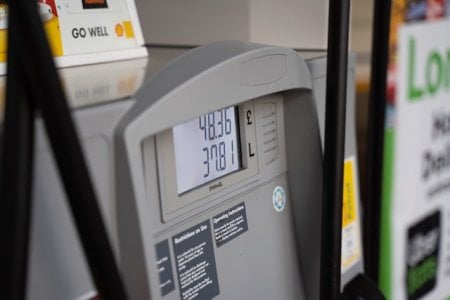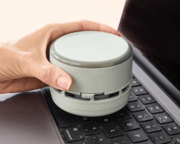Could your petrol spending habits be ruining your chances for a loan?
By
Seia Ibanez
- Replies 1
In an era where digital transactions are becoming the norm, it's hard to imagine that spending habits, especially on something as mundane as petrol, could impact your chances of securing a loan.
However, according to a credit check company, this is precisely what's happening in Australia.
Experian, which translates tap-and-go transactions in real-time for Australia's big banks, has revealed that small petrol purchases could make banks suspicious.
This is because banks could interpret a $20 petrol purchase as a sign of financial stress, indicating that the individual is cutting back on expenses.
Experian's Head of Innovation, Jordan Harris, explained, ‘It's less around the litre capacity in the tank, it's more around behaviours.’
‘If a consumer was previously always just filling the tank off, that typically doesn't look like a round number–that's $87.96 or maybe these days that's $150.96,’ he added.
This revelation comes when Australia grapples with a cost of living crisis, with E10 unleaded petrol now selling for $1.90 a litre. For a petrol-powered Toyota HiLux with an 80-litre tank, it would now cost $151 to fill up.
‘If someone goes from always filling the tank up—and that looks like non-round number transactions, and they start going to smaller, non-round number transactions, that can sometimes be a sign that that consumer is starting to budget a little more tightly and be a little more deliberate in how they're spending their money,’ Harris said.
‘That can be, in many cases, an indication they might be starting to feel a bit of financial stress or a bit of pressure.’
Privacy on Cash
However, there's a silver lining to this situation.
Harris, who previously specialised in risk management at ANZ, admitted that cash payments for everyday goods such as petrol would prevent banks from having a detailed picture of your spending habits.
'If someone pays in cash, obviously there's no transaction for us to enrich and add extra meaning to,' he said.
'If someone is taking money out of the ATM and just spending it, obviously there's not a lot of insight, there's really no transactions for the bank to see beyond the ATM withdrawal.'
This suggests that using cash for purchases could offer privacy that digital transactions do not.
A recent Reserve Bank report showed that 73 per cent of transactions for $10 or less purchases are paid using a card.
Cash purchases comprised 16 per cent of in-person transactions in 2022, which halved 2019’s numbers, and only 5 per cent of consumers made all their in-person purchases with banknotes and coins.
Harris noted that banks would raise red flags less frequently if customers withdrew large amounts from an ATM.
‘Not to my knowledge, no,' he said.
Loans and Phone Plans
Changes in behaviour may signal the need for a bank to provide support, but they could also prompt a lender to reconsider approving a loan for an individual.
'Potentially, the banks may choose to use it that way,' Harris said.
'They will use that information to help them make a decision on whether to approve or decline a loan.'
Telecommunications like Telstra and Optus could contact Experian regarding a customer wanting a phone plan would be reliable.
‘They might contact our credit bureau to access the credit reporting information we hold on that individual, and that might include things like loans outstanding, credit enquiries, defaults,’ he added.
Credit Cards
Credit check companies such as Experian provide banks and phone companies with consumers' credit card limits and if they have missed repayments.
‘If someone goes over the limit on their credit card, that's something the banks have traditionally used as a sign of stress,' Harris said.
'We'll have a limit of how much they owe–the credit card example, the limit is $10,000, and we might know that account is up to date or we might know it's two payments behind,’ he added.
'But we won't know what the balance on that card is–a thousand dollars or $8,000–which just know that limit of ten and the repayment status.'
Buy Now, Pay Later
Those who use buy now, pay later apps like Afterpay may also create an assumption from the bank that they are struggling financially.
'It's not the fact that consumers might use buy now, pay later–that's a fairly widespread and normal practice,' Harris said.
'So if you are suddenly using buy now, pay later services extensively—you know, seven, eight, nine, ten transactions a month—and previously you might have been using just a couple of times a month, that doesn't mean that you're necessarily doing anything wrong, but it could be an indication you're starting to feel a bit of financial stress,’ he added.
Two-thirds of lending managers have already seen an increased risk of consumer defaults and hardship in the last six months, according to Experian’s survey.
Those who took out a loan since 2019 are three times more likely to default than those who took out a mortgage in 2015.
According to Harris, 75 finance risk leaders in Australia said ‘navigating through the current economic climate isn’t easy’.
The Reserve Bank of Australia raised interest rates for the 13th time in 18 months, with the cash rate at 4.35 per cent.
However, variable mortgage rates have risen to 69 per cent since May 2022, when the cash rate was still at 0.1 per cent.
The Experian survey showed mortgages approved at the end of 2022 were missing repayments almost five times sooner than those in early 2021.
Australian Bureau of Statistics data showed retail sales fell by 0.2 per cent in October, as turnover for clothing and footwear reduced by 1 per cent.
The 1.2 per cent annual retail growth pace was the weakest since August 2021, when Sydney and Melbourne were in lockdown.
ANZ economists Madeline Dunk and Adelaide Timbrell noted retail sales were falling even if more than 400,000 overseas migrants moved to Australia in the year to September.
'That is despite elevated inflation and high population growth,' they said.
But despite the ongoing issue of the country ‘going cashless’, big banks have assured that they will still be committed to using cash despite putting an end to over-the-counter cash transactions in some of their branches.
However, some community advocates expressed unease about the repercussions of this shift on some sectors of society. Read more about the story here.
 What are your thoughts on this? Have you ever considered how your spending habits could impact your ability to secure a loan? Let us know in the comments below.
What are your thoughts on this? Have you ever considered how your spending habits could impact your ability to secure a loan? Let us know in the comments below.
However, according to a credit check company, this is precisely what's happening in Australia.
Experian, which translates tap-and-go transactions in real-time for Australia's big banks, has revealed that small petrol purchases could make banks suspicious.
This is because banks could interpret a $20 petrol purchase as a sign of financial stress, indicating that the individual is cutting back on expenses.
Experian's Head of Innovation, Jordan Harris, explained, ‘It's less around the litre capacity in the tank, it's more around behaviours.’
‘If a consumer was previously always just filling the tank off, that typically doesn't look like a round number–that's $87.96 or maybe these days that's $150.96,’ he added.
This revelation comes when Australia grapples with a cost of living crisis, with E10 unleaded petrol now selling for $1.90 a litre. For a petrol-powered Toyota HiLux with an 80-litre tank, it would now cost $151 to fill up.
‘If someone goes from always filling the tank up—and that looks like non-round number transactions, and they start going to smaller, non-round number transactions, that can sometimes be a sign that that consumer is starting to budget a little more tightly and be a little more deliberate in how they're spending their money,’ Harris said.
‘That can be, in many cases, an indication they might be starting to feel a bit of financial stress or a bit of pressure.’
Privacy on Cash
However, there's a silver lining to this situation.
Harris, who previously specialised in risk management at ANZ, admitted that cash payments for everyday goods such as petrol would prevent banks from having a detailed picture of your spending habits.
'If someone pays in cash, obviously there's no transaction for us to enrich and add extra meaning to,' he said.
'If someone is taking money out of the ATM and just spending it, obviously there's not a lot of insight, there's really no transactions for the bank to see beyond the ATM withdrawal.'
This suggests that using cash for purchases could offer privacy that digital transactions do not.
A recent Reserve Bank report showed that 73 per cent of transactions for $10 or less purchases are paid using a card.
Cash purchases comprised 16 per cent of in-person transactions in 2022, which halved 2019’s numbers, and only 5 per cent of consumers made all their in-person purchases with banknotes and coins.
Harris noted that banks would raise red flags less frequently if customers withdrew large amounts from an ATM.
‘Not to my knowledge, no,' he said.
Loans and Phone Plans
Changes in behaviour may signal the need for a bank to provide support, but they could also prompt a lender to reconsider approving a loan for an individual.
'Potentially, the banks may choose to use it that way,' Harris said.
'They will use that information to help them make a decision on whether to approve or decline a loan.'
Telecommunications like Telstra and Optus could contact Experian regarding a customer wanting a phone plan would be reliable.
‘They might contact our credit bureau to access the credit reporting information we hold on that individual, and that might include things like loans outstanding, credit enquiries, defaults,’ he added.
Credit Cards
Credit check companies such as Experian provide banks and phone companies with consumers' credit card limits and if they have missed repayments.
‘If someone goes over the limit on their credit card, that's something the banks have traditionally used as a sign of stress,' Harris said.
'We'll have a limit of how much they owe–the credit card example, the limit is $10,000, and we might know that account is up to date or we might know it's two payments behind,’ he added.
'But we won't know what the balance on that card is–a thousand dollars or $8,000–which just know that limit of ten and the repayment status.'
Buy Now, Pay Later
Those who use buy now, pay later apps like Afterpay may also create an assumption from the bank that they are struggling financially.
'It's not the fact that consumers might use buy now, pay later–that's a fairly widespread and normal practice,' Harris said.
'So if you are suddenly using buy now, pay later services extensively—you know, seven, eight, nine, ten transactions a month—and previously you might have been using just a couple of times a month, that doesn't mean that you're necessarily doing anything wrong, but it could be an indication you're starting to feel a bit of financial stress,’ he added.
Two-thirds of lending managers have already seen an increased risk of consumer defaults and hardship in the last six months, according to Experian’s survey.
Those who took out a loan since 2019 are three times more likely to default than those who took out a mortgage in 2015.
According to Harris, 75 finance risk leaders in Australia said ‘navigating through the current economic climate isn’t easy’.
The Reserve Bank of Australia raised interest rates for the 13th time in 18 months, with the cash rate at 4.35 per cent.
However, variable mortgage rates have risen to 69 per cent since May 2022, when the cash rate was still at 0.1 per cent.
The Experian survey showed mortgages approved at the end of 2022 were missing repayments almost five times sooner than those in early 2021.
Australian Bureau of Statistics data showed retail sales fell by 0.2 per cent in October, as turnover for clothing and footwear reduced by 1 per cent.
The 1.2 per cent annual retail growth pace was the weakest since August 2021, when Sydney and Melbourne were in lockdown.
ANZ economists Madeline Dunk and Adelaide Timbrell noted retail sales were falling even if more than 400,000 overseas migrants moved to Australia in the year to September.
'That is despite elevated inflation and high population growth,' they said.
But despite the ongoing issue of the country ‘going cashless’, big banks have assured that they will still be committed to using cash despite putting an end to over-the-counter cash transactions in some of their branches.
However, some community advocates expressed unease about the repercussions of this shift on some sectors of society. Read more about the story here.
Key Takeaways
- Credit check company Experian warns that small petrol purchases can make banks suspicious and potentially affect loan approval.
- The company points out that using cash for everyday purchases like petrol can provide privacy and prevent banks from tracking detailed spending habits.
- Changes in behaviour, such as a shift from tapping and going to smaller, non-round transactions, can indicate a consumer is feeling financial stress and may cause banks to reconsider loan approval.
- The use of 'buy now, pay later' apps like Afterpay can also be seen as an indicator of financial struggle if usage intensifies, while credit card limits and missed repayments contribute to profiles created by credit check companies.








